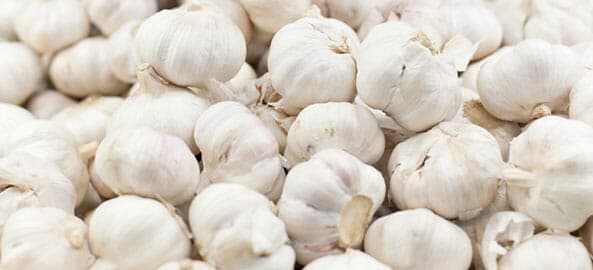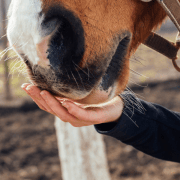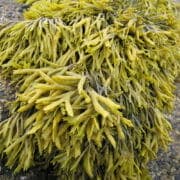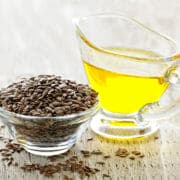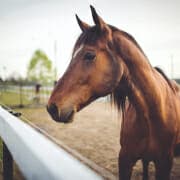Garlic for Horses: Should You Feed It?
Herbs have been used in some cultures as remedies for disease and illness for more than 5000 years and their effectiveness as part of an ‘integrated system of primary health care’ is well recognised. Given the benefits we see in humans, it is becoming more and more commonplace to use herbs like garlic for horses. However, in many cases for horses, herbs are used not as part of a holistic approach to health care, but rather as a nutritional supplement.
Herbs are commonly added to diets as sources of copper, sulphur, zinc, selenium and iodine. The problem is that most herbs actually contain very little of these nutrients (with the exception of iodine in seaweed). So, to supply any real amounts of nutrients, these ingredients need to be fed at high levels … The problem is, some herbal products like garlic can be toxic for horses, especially if you feed them at high rates. So, if you are considering feeding garlic to your horse, you first need to consider the potential benefit to be gained versus the risks involved.
Why is garlic even considered as a feed ingredient?
The answer to this question is likely because we as humans have used it with good effect in our own diets for thousands of years. Traditionally in human medicine, garlic is used as an anti-microbial agent. A compound called allicin, present in garlic, is known to have an anti-microbial effect which (along with some other compounds) is thought to give garlic this property. Garlic also has a well-liked taste and smell and is used to give food flavour.
As humans, we all too often fall into the trap of thinking what is good for us must be good for our animals. But take chocolate, macadamia nuts, garlic and onions as an example. All of these foods are eaten extensively by humans and all (yes, even chocolate) have health benefits when eaten in moderation – yet every one of these foods is poisonous to dogs, highlighting that just because we can eat it and receive health benefits, it doesn’t mean that our companions, including our horses can.
We really don’t know the answer to this question. There is also a question over whether it kills off beneficial bacteria in the horse’s gut, which the horse relies on to digest fibre. I guess the real question is WHY do we want to feed a horse an anti-microbial agent all the time? It would make more sense to only feed one when the horse is at risk of microbial infection. We would never consider giving antibiotics all the time, so why is garlic any different. Perhaps the perception that it is ‘natural’ makes us feel more inclined to use it all the time rather than just when it may be needed. Sometimes it is fed all the time in a horse’s diet not as an anti-microbial, but as a nutrition supplement, raising the question of whether it is useful for this purpose.
Does garlic provide a horse with beneficial nutrients?
As a nutritional supplement to supply vitamins and minerals, garlic rates poorly. Feeding 100 grams of dried garlic per day (which is far more than I suspect any of you would be feeding) provides the following nutrients for a 500 kg horse in moderate work (shown as percent of Recommended Daily Intake or RDI):
| Nutrient | % RDI supplied by 100 g/day dried garlic |
|---|---|
| Calcium | 1.1 |
| Phosphorous | 1.3 |
| Copper | 0.4 |
| Zinc | 0.6 |
| Selenium | 1.1 |
| Manganese | 0.8 |
| Iodine | 0.0 |
| Iron | 0.6 |
As you can see from the table above, garlic provides less than 2% of a horse’s daily requirement for these minerals and as such is virtually useless as a ‘mineral supplement’.Try this in your own horse’s diet in FeedXL, enter 100 grams of garlic in the diet and look at the graph to see what it contributes to the diet; its nutritional effect is virtually nil.
Is garlic safe for horses?
There is much debate over whether or not garlic is safe to feed horses. A study conducted by Wendy Pearson at the University of Guelph, Canada in 2005 found that when fed at high levels (250 g/day for a 500 kg horse) garlic caused an array of changes in the horse’s blood including an increase in mean corpuscular volume (MCV), decreases in red blood cell count and blood haemoglobin concentration. These changes eventually led to a condition known as Heinz Body Anaemia. While the dose rate they used was high, the researchers note that currently a safe dose rate for horses is unknown. Because research has not been carried out looking at feeding lower doses of garlic over a long period of time we don’t know ‘scientifically’ if it is safe or not.
Onion, a close relative of garlic and containing the same toxic component (n-propyl disulfide) is also known to be toxic to horses, with research conducted in 1972 showing that consumption of onion tops caused severe anaemia. Again, this study used large amounts of onion tops to produce life threatening anaemia within 11 days, meaning the question of whether onions and garlic would be safer at lower levels still remains. However, US veterinarian Dr Karen Hayes notes in her article “Feeding Garlic – The great garlic debate” that she sees a handful of cases of Heinz Bodied Anaemia every year resulting from horses consuming wild onions in amongst their pasture or in horses who have raided a compost or garden and eaten garlic or onions, suggesting perhaps that the dose doesn’t need to be high for effects to occur. In any case, the effects the researchers have observed when feeding garlic or onions at high levels have been severe. While feeding garlic at lower levels over long periods of time may not cause a life-threatening anaemia, it may be causing anaemia that is mild enough not to be overtly noticed, but prevalent enough to reduce your horse’s stamina and performance and Dr Hayes suggests it may even affect a horse’s ability to resist disease.
If you do feed garlic and wish to continue feeding it, it would be a good idea to run a blood analysis on your horse to make sure their mean corpuscular volume, haemoglobin and packed cell volume levels are in the normal range and that no Heinz Bodies are present.
So, should you feed it or not?
Our stand on feeding garlic to horses is unless there are DEFINITE and DEMONSTRABLE benefits associated with feeding garlic to your specific horse, don’t feed it. While it is true that it hasn’t been proven that lower dose rates of garlic will harm your horse, it also hasn’t been proven that feeding garlic to your horse provides any specific benefits. We also don’t know what garlic does to horses when fed consistently at low feeding rates.
Next time you go to tip garlic into your horses feed just take a moment to consider why you are feeding it, what benefit the horse is getting and whether it is worth taking the potential risk, even if it is only a small one. There is no doubt herbs can make valuable nutraceutical additions to diets but if you are considering using them as nutritional supplements, use FeedXL to see what it is they are actually adding to the diet.
Do you have a question or comment? Do you need help with feeding?
We would love to welcome you to our FeedXL Horse Nutrition Facebook Group. Ask questions and have them answered by PhD and Masters qualified equine nutritionists and spend time with like-minded horse owners. It’s free!
Click here to join the FeedXL Horse Nutrition Facebook Group

